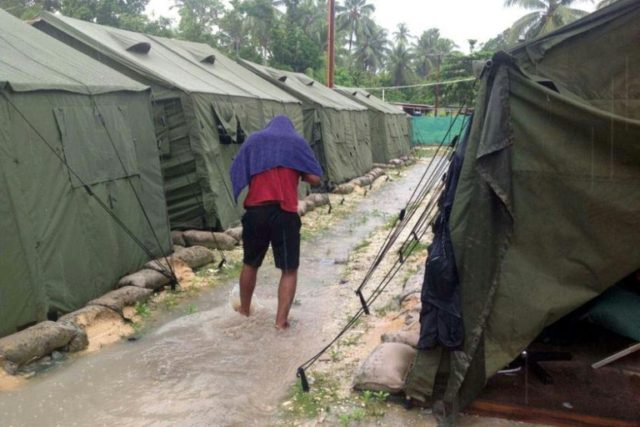Australian Minister for Home Affairs Peter Dutton sees an uncertain future for many of the 1,305 refugees currently warehoused in Papua New Guinea and the island of Nauru.
“We continue to talk to third countries, but let me tell you, there are very few prospects, if any, on the horizon,” he said on Monday.
“Let’s be realistic: when Labor talks about some mythical third country, it doesn’t exist,” he said. “People are not jumping out of their skin to provide places, and that is a reality.”
“In relation to the Iranians that are on Manus or Nauru, Tehran will not issue travel documents for those people unless they come back willingly,” Dutton added. Presumably, people who endured terrible hardships to flee from Iran are not eager to return and place themselves at the mercy of the theocracy.
According to Reuters, many of the asylum-seekers in question are having trouble getting their applications to live in the United States processed due to the “extreme vetting” procedures that have been implemented for refugees from Middle Eastern and African trouble spots.
Most of the refugees were supposed to be absorbed by the United States under an arrangement made by President Barack Obama that was denounced as a “dumb deal” and the “worst deal ever” by President Donald Trump shortly after he took office.
Trump is not the only critic who has wondered exactly why the U.S. should take in hundreds of refugees to accommodate Australia’s hardline stance against accepting any. According to Dutton, no other country is jumping at the chance to take the asylum-seekers who don’t get past America’s strengthened vetting system. Reuters implies that verifying the identity and security status of some of these individuals is proving extremely difficult.
There seems to be little hope of the refugees settling on Papua New Guinea or Nauru. The few asylum-seekers admitted to Australia reportedly had great difficulty finding jobs and making ends meet.
“There are no services, no support, no jobs. They have no future,” said Ian Rintoul of the Refugee Action Coalition.
Australia’s refugee camps have been criticized for terrible living conditions, with chronic health issues reported for inmates. When the government of Papua New Guinea declared the Manus Island camp illegal and ordered it shut down in October, hundreds of refugees refused to leave, claiming they faced violence from the locals. The local police chief agreed that their safety could not be “taken for granted,” noting that several assaults have been perpetrated against refugees over the years. Papua New Guinea insisted it had “no obligation” to take care of the refugees once Australian funding ran out.
U.N. officials have denounced Australia’s treatment of refugees as “cruel, inhuman, and degrading,” citing reports of poor physical and mental health among both adults and children, and claims that female asylum-seekers have been sexually abused. Psychiatrists in Taiwan warned last week that a 17-year-old boy who has lived in the Nauru camp since he was 11 has developed severe mental illness and might commit suicide if he is returned there.
Even many liberal members of Australia’s political opposition agree with the basic tenet of the nation’s tough immigration policy, which is that accepting refugees could unleash a flood of asylum-seekers or a plague of human smuggling operations.
New Zealand’s Prime Minster Jacind Ardern has strongly criticized Australia’s policies and offered to take up to 150 of the refugees, possibly in a bilateral arrangement with Papua New Guinea that bypasses Australia entirely.
Commenting on that possibility, Dutton worried that it might upset negotiations with the United States to take most of the refugees, and also warned that “people smugglers are watching eagerly at the moment.”
“If any boats arrive tomorrow, those people aren’t going to Auckland, they’re going to the processing centre on Nauru,” Dutton said, concerned that refugees might rush for Australia if they think they will swiftly be conveyed to New Zealand for permanent resettlement.
Ardern’s proposal came with a caveat that applicants would need to satisfy New Zealand’s “relevant immigration policies, security and biometric checks, and risk and health assessment” in order to qualify, so even if a deal with New Zealand is struck, there would still be a sizable remainder of refugees no one wants to take. It seems everyone in the world loves to pontificate about the moral responsibility of other people to unconditionally grant asylum requests.

COMMENTS
Please let us know if you're having issues with commenting.